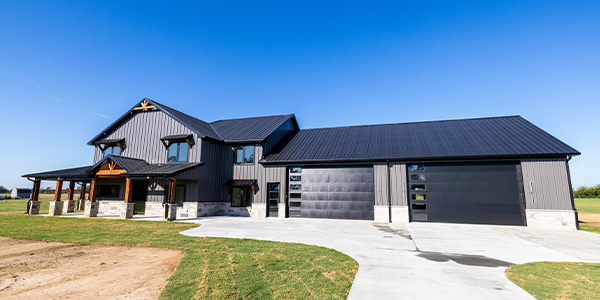Homebuyers
How Much Is a Mortgage on a $400,000 Home?
April 19, 2024
Monthly mortgage payments factor heavily into a home's affordability. A larger percentage of today's homebuyers are looking at homes in the $400,000 range. If you're one of them, you might be wondering what your monthly payments will look like. How much is a mortgage on a $400,000 home? Let's break down all of the intricacies of a typical mortgage to get the answer.
Understanding Mortgage for a $400,000 Home
A mortgage loan allows a borrower to obtain the financing they need to purchase a new home. It's the most common way that homes are purchased. While agreements vary based on lender and circumstance, the general setup is that borrowers make monthly mortgage payments with interest for a specific term until the full loan amount is paid back.
Both the mortgage total and monthly payments for a $400,000 home can look different for different borrowers. For example, the size of your down payment determines how much you'll need to borrow. Additionally, your interest rate, loan term, and mortgage type also impact monthly payments.
Income Needed for $400,000 Mortgage
With so many factors in the mix, it's difficult to give a blanket answer about the income needed for a $400,000 home as a first-time homebuyer. A lender will look at the specifics of your financial picture before determining if your income is appropriate for a $400,000 home. The traditional "28% rule" in the mortgage world states that borrowers should not spend more than 28% of their monthly gross income on mortgage principal, interest, taxes, and insurance. If you can comfortably afford the monthly total after your down payment and other factors are in the equation by not paying more than 28%, a home at this price may be appropriate for you.
Another common rule is that a borrower's debt-to-income ratio (DTI) should not exceed 35% to 45%. However, there are exceptions. Is DTI a new term to you? Your DTI represents the percentage of your monthly gross income that's directed toward debt payments. The quick way to figure out your DTI is to divide your monthly debt payments by your gross monthly income.
Down Payment on a $400,000 Home
There's much flexibility when it comes to choosing a down payment on a $400,000 home. The idea that you must put down 20% on a mortgage is outdated advice. Of course, that doesn't mean this isn't the best choice for some borrowers who have the cash on hand.
The big thing to remember is that a larger down payment could help to significantly reduce your monthly payments in some cases. You may pay less in interest on your loan simply because you're borrowing a smaller amount. However, buyers who prefer to put down less than 20% still have plenty of options. Here's a peek at minimum down payment requirements by loan type:
- Conventional loan without private mortgage insurance (PMI): 20%
- Conventional loan with private mortgage insurance (PMI): 3%
- Jumbo loan: 10%
- FHA loan: 3.5%
- VA loan: $0
- USDA loan: $0
These are just general guidelines. Lenders may require borrowers with low credit scores or higher DTIs to have larger down payments than the minimum industry requirements. Working one-on-one with a lender is the best way to see what's possible.
What Is the Monthly Payment on a $400,000 Mortgage?
If your full mortgage total is $400,000 after your down payment, that $400,000 will be broken up into monthly payments based on your loan term. Let's assume you have a fixed-rate 30-year mortgage for dissecting your monthly payments. Here's what goes into each monthly payment:
- Principal: This portion of your monthly payment represents part of the balance that you borrowed from a lender. Each payment is applied to the principal balance.
- Interest: You and your lender will agree to an annual interest rate for your loan. This will be expressed as 4%, 5.2%, 6.3%, or some other number that's in line with current interest rates. When calculating your monthly mortgage payments, the annual interest rate is divided by 12.
- Taxes: Your property taxes are determined by your local town, city, or county mill rate. While some borrowers pay their taxes independently, most include them in their monthly mortgage payments to have the lender submit them on their behalf.
- Insurance: While home insurance premiums may be due annually, monthly, quarterly, or semiannually, many lenders require escrow accounts to ensure that payments are made on time. Under this arrangement, premium payments are broken down among monthly mortgage payments.
How much is a mortgage on a $400,000 home going to cost you each month? A mortgage calculator can help you plug in different numbers and scenarios to get an idea of what your mortgage payment of $400,000 might look like.
Additional Costs to Consider
What is the monthly payment on a $400,000 mortgage when you factor in all of the various costs of homeownership? Everything from your loan details to the area where you live can impact the true cost of homeownership. Here's a glance at the main factors that can skew your payments:
- Property Taxes: The combination of a high-value home and a high-cost-of-living area can make property tax a significant monthly expense. To get an idea of what your tax payments will look like every month for a specific home, take a look at the annual property tax listed for the most recent year. Divide that number by 12 to get an estimate of what you can expect to owe monthly. Keep in mind that property tax rates can vary by year based on when local governments do reevaluations.
- Homeowners Insurance: Lenders generally make homeowners insurance mandatory because a policy protects against financial loss in the event of a fire, hurricane, tornado, or other disaster. Monthly premiums can vary widely based on location and home type. While your policy won't take effect until you close, you'll need to have proof of coverage by closing.
- Private Mortgage Insurance (PMI): If you decide to put down less than 20% on a Conventional mortgage, you'll be required to pay for PMI until your principal balance reaches 78% of the home's original value. While PMI rates vary, you might expect to pay anywhere from 0.22% to 2.25% of a mortgage's value.
- Maintenance and HOA Fees: Homeownership is a lifetime financial commitment! Repairs, updates, lawn care, landscaping, snow removal, and other common costs can total several thousand dollars per year. If your property is part of a homeowner association, your monthly HOA fees may fall somewhere around the national average of $200.
Tips for Choosing the Right Mortgage
How much is a mortgage on a $400,000 home? The surprising answer is that the cost can vary simply based on the lender you choose. That's why it's smart to shop around with trusted, established lenders to find the best rate and terms for different types of mortgages. Fortunately, today's lenders understand that different buyers have different financial situations and goals.
As a borrower, you'll need to spend time selecting the right mortgage based on your financial situation. This might look like putting down a smaller down payment to be able to get into the market today instead of saving up for a few extra years. If you're someone who values lower monthly payments, making the larger down payment to achieve 20% down may make you feel more comfortable. The bottom line is that most borrowers often don't know exactly what's possible until they sit down with a lender who can look over all of the documents needed for a home loan with them to get some real numbers down on paper.








 Smart Moves Start Here.
Smart Moves Start Here.